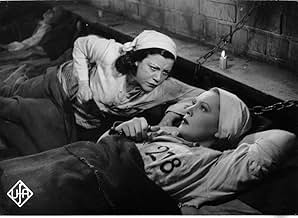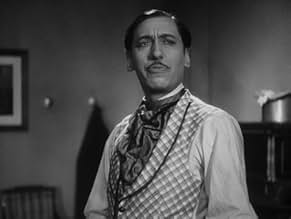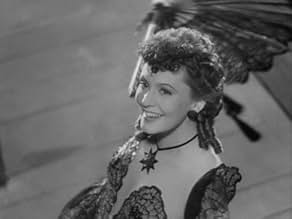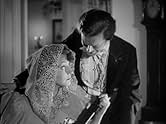Aggiungi una trama nella tua linguaIn 1846 the actress Gloria Vane is performing at the Adelphi Theatre, London. She is in love with the destitute nobleman Albert Finsbury, who is shortly departing to Australia to become an o... Leggi tuttoIn 1846 the actress Gloria Vane is performing at the Adelphi Theatre, London. She is in love with the destitute nobleman Albert Finsbury, who is shortly departing to Australia to become an officer in the Queen's regiment. He is supposed to pay his debts before leaving and uses an... Leggi tuttoIn 1846 the actress Gloria Vane is performing at the Adelphi Theatre, London. She is in love with the destitute nobleman Albert Finsbury, who is shortly departing to Australia to become an officer in the Queen's regiment. He is supposed to pay his debts before leaving and uses an altered cheque to do so. After Finsbury has left, the forgery is discovered. To protect h... Leggi tutto
- Regia
- Sceneggiatura
- Star
- Premi
- 1 candidatura in totale
Recensioni in evidenza
Most aspects appear to be authentic here and delivered in a fragile manner by the cast but there are actually, to this day, two people who make their portrayals worth deeper analysis: Willi Birgel as Sir Albert and Zarah Leander as Gloria Vane. Let me make some points about them before I move to the artistic aspect of the movie.
As a matter of fact, this is a movie which made the Swedish actress a star at Ufa Studios after her first German film PREMIERE (which was not at Ufa). A debut at the studio and a true ZARAH LEANDER film at first sight. As a newcomer at the time (1937), she makes her entrance as an artistic personality, a character capable of loving and waiting, a suffering 'product to identify with' for female audiences bringing to light certain mechanisms of social hypocrites (mind you that the story is not set in Germany in order not to evoke some controversial interpretations or misunderstanding but... in England and, foremost, in Australia – the safest choice of locale seen as a 'new land'). She is a character of a typical woman of her films, echoes certain features widespread at the time bringing everything to pinnacle of melancholy. The Paramatta sequence as well as the trial accurately address the social conventions and question their morality. It is, however, foremost afflicted and influenced by women's emancipation, women's rights - a handkerchief for sensitive female viewers necessary. Here, Zarah's Gloria Vane draws parallels to many femme fatales of the time, including ROMANZE IN MOLL or DER WEG INS FREIE (Way To Freedom) which clearly draws parallels to this film along with its title. More to say, the camera seems to celebrate her face (as it was in case of Garbo at Hollywood). And yet...Zarah is twice an artist: with her deep voice, she does not play so memorably as she sings memorably (I will develop this aspect with music of the film).
It is, however, not the woman who suffers most and jerks our tears to the very end. It is Sir Albert, a seemingly noble man of prospects in life, of promising marriage with beautiful Mary and, despite everything, a character of strong personal conflicts, destructive torments. Willi Birgel, being Zarah's favorite co-star, delivers a unique portrayal of shadowed character never remaining in the shadow of our attention. Although we mostly see him from her pretentious perspective, the actor manages to draw a vibrant personality. Now let me move to general artistic merits of the film.
Great cinematography supplies a viewer with exceptional visual experience. Wolfgang Paul in Der Tagesspiegel (1974) and Thomas Kramer in Reclams Lexikon Des Deutschen Films (1995) observe certain details on that point. The cinematography, strongly influenced by German Expressionism, makes a lot of scenes memorably echo haunting whispers within the screen art introduced by Murnau or Pabst. Mind you the shadows at Alfred's tragic night or his leave for Australia and Zarah's image at the harbor, practically the iconic image of the movie's content. Two more aspects, actually, serve undeniable aid in evoking the film's mood: MUSIC and RAIN.
Music is in the hands of Zarah Leander, she delivers her lines in singing, her songs aid the melancholy of the whole atmosphere as well as provoke contradictions. Additionally, the costumes deliver visual taste. Mind you two songs end with an almost religious reference to Alleluia and Amen. The song the film is probably most famous for, "Yes Sir" clearly delivers the sentiments of the time (the 1930s) rather than the 19th century when the action of the film is set. But...no need for historical accuracy in a movie like this. And rain...something typical for romantic sorrows, tear-jerking sentimentality, soap opera-like impressions. In one of her songs, she sings about standing in the rain drawing a clear metaphor to tormented states of mind and heart. That bears resemblance with the storytelling of many of her films, not only this one.
All in all, an interesting film to see, an important work of art from the historical and dramatic standpoint. The hidden meaning within the name 'Gloria' along with the surprising and jubilant conclusion at the finale still lead the viewer towards the new shores of classical movie viewing and its interpretation.
But he also made some (largely forgotten) films in Germany. I don't know why his German films are seldom seen. Is it because one suspects a Nazi flavour? This is not realy the case. Sierck left Nazi Germany relatively late (1937) but his second wife was Jewish and politically he was certainly no supporter of National Socialism. Is it because his German films are real melodrama's? Could be. In his American films beneath the melodrama there is a second layer with hidden criticism on bourgeois moralism. This second layer is absent in his German films if only because they do not play in bourgeois circles but more often in aristocratic circles with their own codes of honor.
This is not to say that his German films are not worth watching. His two films with the Swedish star Zarah Leander ("Habanera" and "Zu neuen Ufern", both of 1937) are certainly entertaining. Of this two films I prefer "Zu neuen Ufern", in which Zarah Leander plays a tragic woman who seems to fall for the wrong man. The film does have a touch of Brecht in it, and this is not by chance because a few years earlier Sierck directed "The threepenny opera" for stage.
In prison, accompanied by her fellow female inmates, she sings a beautiful, sad song directed to her rascally lover: 'I have such a deep longing for you'. She is released from Paramatta prison in order to marry a handsome farmer (played by Viktor Staal) - but she runs away from him, only to discover that the Birgel character is on the verge of marrying the governor's daughter.
Heartbroken, she tries to return to prison, then to the stage, but is booed by the Australian audience for her gloomy act - a real irony this, since the song she's singing, 'I'm standing in the Rain' is a real beauty, haunting and melancholy, making full use of Leander's lovely contralto voice. Zu Neuen Ufern is a very emotionally involving film, a pointer to the films Detlev Sierck would later make in the US under his anglicised name, Douglas Sirk. Perfect for a rainy Sunday, and proof of the star power of Zarah Leander.
Mistreated by her lover, she nonetheless takes the blame for his criminal activity, accepting a prison sentence, in dim hopes of reuniting with the scoundrel years later. A twist of fate allows her to leave prison, but of course at a price. The predictable plot moves along, including 2 memorable songs, the heartbreaking "Ich steh' I'm Regen" and the up-tempo "Yes, Sir!", both becoming Leander trademarks.
Like Joan Crawford, Marlene Dietrich, Bette Davis and other Classic Cinema Divas, Zarah Leander has achieved cult status. "Zu neuen Ufern" would be the first film to be mentioned by any fan. Enjoy the drama, and enjoy the queen...the Drama Queen of Old German Cinema at her best!
Lo sapevi?
- QuizGerman censorship visa # B. 45781 delivered on 20-7-1937.
- ConnessioniFeatured in Hitlers Frauen: Zarah Leander - Die Sängerin (2001)
I più visti
Dettagli
- Tempo di esecuzione
- 1h 46min(106 min)
- Colore
- Proporzioni
- 1.37 : 1
































